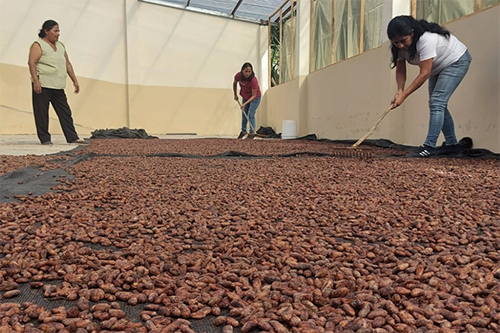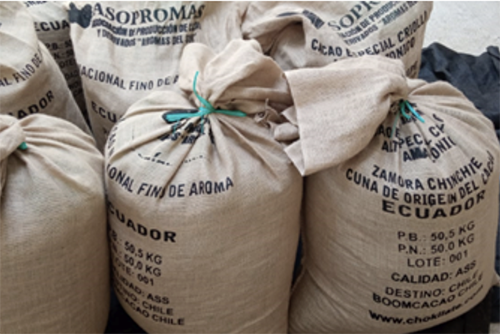
While chocolate is ubiquitous today, the origins of cacao can be traced back to an Ecuadorian province called Zamora Chinchipe tucked at the far end of the Amazon Basin. Today, this province is home to a small producers’ organization with big plans. Asociación de Producción de Cacao y Derivados del Sur (ASOPROMAS) is aspiring to become an agribusiness leader in the production and trading of fine aroma cacao, high-quality chocolates, and other cacao by-products.
Through support from NCBA CLUSA’s U.S. Agency for International Development (USAID)-funded Farmer-to-Farmer program, ASOPROMAS has more than tripled their membership—from 20 to 70 members, 29 of whom are women. Their membership growth—along with their commitment to environmentally sustainable production—hold promise for continued success. But they face challenges like pests and disease that cut into their profits. And their initial efforts to apply for grants were unsuccessful.
In response, Moriah Bilenky, a volunteer with NCBA CLUSA’s Farmer-to-Farmer program, led a training on grant management for the association in March 2022. Moriah worked with the cooperative members, walking them through each step of the proposal process. During the training, the association learned about opportunities from organizations that fund projects with cacao producers—including how many funders prioritize gender equality.
During Moriah’s assignment, ASOPROMAS members decided they needed a better understanding of gender equality to qualify for these grants. So, they requested an additional training on gender equality. Five women, or 45% of the members who actively participated in the training, were women.
After the assignment, Moriah shared her recommendations with the association. One recommendation that ASOPROMAS immediately applied was to become more active on social media.”[This] will strengthen its virtual presence by collecting more media for its website and social media platforms, such as farmer highlight pieces with pictures,” Moriah said.
Following this recommendation, ASOPROMAS updated the information on its Facebook page, created an institutional email for the business, and posted more updates about the association. They realized that increasing their social media presence would make them more visible to customers, partners and new members.
In July 2022, a Chilean chocolatier sourcing Ecuadorian chocolate contacted the association through their Facebook page. Although he considered other suppliers, due to the quality of ASOPROMAS cacao, the chocolatier chose to buy their fine aroma cacao. In December, ASOPROMAS exported its first batch of 500 kg of dried cacao beans.

ASOPROMAS Commercial Manager Martha Lituma Vera noted that the association’s organic certification also contributed to its first successful export. During a previous Farmer-to-Farmer assignment on organic certification, volunteer Leonard Pollara recognized that ASOPROMAS needed to strengthen its food safety protocols.
“We learned from Leonard about traceability and how to keep records from the harvest to the final product,” Martha said. “It made it easier to meet the requirements for the exportation permissions.”
ASOPROMAS earned $1,000 more exporting their cacao than they would have selling the same amount locally. Typically, ASOPROMAS sells their cacao for around $100-150 per bag in local sales. By exporting it instead, they earned an additional $90 per bag—profits they were able to reinvest in their business. They are hoping to maintain this relationship and increase the amount of exported cacao, which will result in an overall increase in income for the association.
Going forward, ASOPROMAS plans to invest more in cacao by-products. Already, it has begun diversifying its income by developing new value-added cacao products, leading to increased sales and more suppliers. In the future, the association plans to purchase its own machinery to process cacao paste, rather than paying another company for this service.
ASOPROMAS’ commitment to growth and sustainability has already made their mark. The association is on its way to becoming one of the strongest associations in the region and a model for other cacao producers’ organizations.


